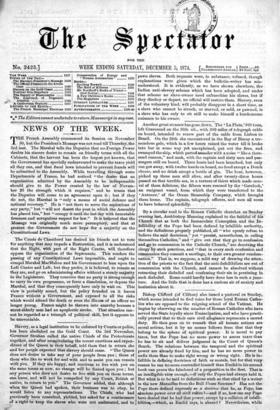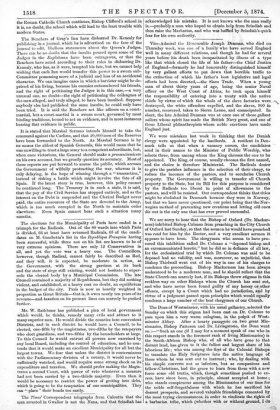Bishop Clifford (of Clifton) also issued a pastoral on Sunday,
which seems intended to find voice for those loyal Roman Catho- lics who are opposed to the reigning school of the Vatican. He begins by observing on the number of Roman Catholics who have served the State loyally since Emancipation, and who have practi- cally proved that to their ears civil allegiance represents a sacred duty. He then goes on to remark that all human actions are moral actions, but it by no means follows from that that they belong to the sphere of spiritual power. It is moral to pay taxes, but the Pope has no more power to assess taxes than he has to sit and deliver judgment in the Court of Queen's Bench. The relations between the temporal and the spiritual power are already fixed by him, and he has no more power to unfix them than to make right wrong or wrong right. He is in- fallible in defining doctrines of faith or morals, but for that very reason he can no more contradict himself than Euclid in his second book can prove the falsehood of a proposition in the first. That is an intelligible view enough,—if only the Popes had always held it. But what is to be said to definitions such as that cited by a writer in the new Macmillan from the Bull Un am Sanctam ? Has not the Pope there defined expressly as a doctrine that he, as Pope, has absolute power over all civil rulers ?—and if so, how can any Pope have denied that be had that power, except by a collision of infalli- bilities,—which, as Euclid says, is absurd ? Nevertheless, while the Roman Catholic Church continues, Bishop Clifford's school in it is, no doubt, the school which will lead to the least trouble with modern States.



































